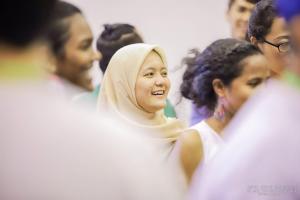Understanding History: Indonesia and East Timor
 There was a session at the Asia Pacific Youth Conference (APYC) 2016 called, “Let’s Talk”, where the organizers provided us with some projects or initiatives to discuss; we had to choose one of the projects. I chose the "Run for Peace Indonesia - East Timor" discussion and expected nothing but new insights. My friend Lia and Rina from East Timor were in the same group as I. We started to talk about how the project would run and and some other technical things but what was missing was why the project should be held. I wasn't very clear about the background of the project therefore I asked them why we should run this friendly project between Indonesia and East Timor.
There was a session at the Asia Pacific Youth Conference (APYC) 2016 called, “Let’s Talk”, where the organizers provided us with some projects or initiatives to discuss; we had to choose one of the projects. I chose the "Run for Peace Indonesia - East Timor" discussion and expected nothing but new insights. My friend Lia and Rina from East Timor were in the same group as I. We started to talk about how the project would run and and some other technical things but what was missing was why the project should be held. I wasn't very clear about the background of the project therefore I asked them why we should run this friendly project between Indonesia and East Timor.
I knew nothing about the relationship or the past history of Indonesia and East Timor. My friend Lia and Rina, with their strong hearts, shared about their experiences being treated harshly by the Indonesian army back in the 90s. They were not the only ones who received such treatment. It happened in almost every family in East Timor. They told me they watched one of their family members shot by army personnel in front of their eyes, how the women were treated badly, how the kids weren't allowed to go outside to play, and so on.
It reminded me of when I was in Junior High School. I remembered asking my history teacher why East Timor separated from Indonesia and I never received a clear answer to that question instead she said "Indonesia is lucky they separated themselves from us". Even from a young age, our teachers told us that there was nothing wrong and everything was okay while in reality our brothers and sisters fight for their lives to get freedom. Listening to this for the very first time, my heart was broken. I felt so ashamed of being Indonesian; I had much guilt in my heart that I couldn't even say a word when they told me their experiences.
Lucky me, I participated again in APYC Malaysia 2018. This time I joined because I wanted to find my calling and I wanted to see a clearer path for my journey. What I got was beyond expectations. One of them was when I apologized to my East Timor friend, Uka Pinto during the "Revisiting History" session. I wasn't planning to do it at all, it just happened spontaneously as the speakers finished the discussion. I apologized to her as an Indonesian for what happened in the past, for what my ancestors did to the East Timor people and how it impacted their families until now. It was such a powerful moment for me personally even though the feeling of guilt wasn't a hundred percent released because I couldn't do anything but apologize.
If I had not met Initiatives of Change (IofC), I would not have known the truth; I would not have understood how such cruelty affected so many people even after decades. I probably would not have had the opportunity to apologize to our neighbors in East Timor. I am blessed to have been involved in the IofC movement. The four IofC values have taught me about so many aspects of my life.
Alifah Djula

